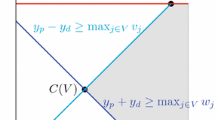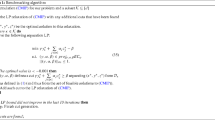Abstract
The mixing set with a knapsack constraint arises in deterministic equivalent of chance-constrained programming problems with finite discrete distributions. We first consider the case that the chance-constrained program has equal probabilities for each scenario. We study the resulting mixing set with a cardinality constraint and propose facet-defining inequalities that subsume known explicit inequalities for this set. We extend these inequalities to obtain valid inequalities for the mixing set with a knapsack constraint. In addition, we propose a compact extended reformulation (with polynomial number of variables and constraints) that characterizes a linear programming equivalent of a single chance constraint with equal scenario probabilities. We introduce a blending procedure to find valid inequalities for intersection of multiple mixing sets. We propose a polynomial-size extended formulation for the intersection of multiple mixing sets with a knapsack constraint that is stronger than the original mixing formulation. We also give a compact extended linear program for the intersection of multiple mixing sets and a cardinality constraint for a special case. We illustrate the effectiveness of the proposed inequalities in our computational experiments with probabilistic lot-sizing problems.
Similar content being viewed by others
References
Atamtürk A.: Strong formulations of robust mixed 0–1 programming. Math. Program. 108, 235–250 (2006)
Atamtürk A., Nemhauser G.L., Savelsbergh M.W.P.: The mixed vertex packing problem. Math. Program. 89, 35–53 (2000)
Balas E.: Disjunctive programming: properties of the convex hull of feasible points. Discrete Appl. Math. 89, 1–44 (1998)
Beraldi P., Ruszczyński A.: A branch and bound method for stochastic integer programs under probabilistic constraints. Optim. Methods Softw. 17, 359–382 (2002)
Beraldi P., Ruszczyński A.: The probabilistic set covering problem. Oper. Res. 50, 956–967 (2002)
Charnes A., Cooper W., Symonds G.Y.: Cost horizons and certainty equivalents: an approach to stochastic programming of heating oil. Manage. Sci. 4, 235–263 (1958)
Conforti M., di Summa M., Wolsey L.A.: The mixing set with flows. SIAM J. Discrete Math. 21(2), 396–407 (2007)
Conforti M., Wolsey L.A.: Compact formulations as union of polyhedra. Math. Program. 114, 277–289 (2008)
Cornuéjols G.: Valid inequalities for mixed integer linear programs. Math. Program. 112, 3–44 (2008)
Dentcheva D., Prékopa A., Ruszczyński A.: Concavity and efficient points of discrete distributions in probabilistic programming. Math. Program. 89, 55–77 (2000)
Günlük O., Pochet Y.: Mixing mixed-integer inequalities. Math. Program. 90, 429–457 (2001)
Lejeune M.A., Ruszczyński A.: An efficient trajectory method for probabilistic inventory-production-distribution problems. Oper. Res. 55(2), 378–394 (2007)
Luedtke J., Ahmed S.: A sample approximation approach for optimization with probabilistic constraints. SIAM J. Optim. 19(2), 674–699 (2008)
Luedtke J., Ahmed S., Nemhauser G.: An integer programming approach for linear programs with probabilistic constraints. Math. Program. 122(2), 247–272 (2010)
Lulli G., Sen S.: Branch-and-price algorithm for multistage stochastic integer programming with application to stochastic batch-sizing problems. Manage. Sci. 50(6), 786–796 (2004)
Miller A.J., Wolsey L.A.: Tight formulations for some simple mixed integer programs and convex objective integer programs. Math. Program. 98, 73–88 (2003)
Miller B.L., Wagner H.M.: Chance constrained programming with joint constraints. Oper. Res. 13, 930–965 (1965)
Prékopa A.: Contributions to the theory of stochastic programming. Math. Program. 4, 202–221 (1973)
Prékopa A.: Dual method for the solution of a one-stage stochastic programming problem with random RHS obeying a discrete probability distribution. ZOR Methods Models Oper. Res. 34, 441–461 (1990)
Ruszczyński A.: Probabilistic programming with discrete distributions and precedence constrained knapsack polyhedra. Math. Program. 93, 195–215 (2002)
Saxena A., Goyal V., Lejeune M.A.: MIP reformulations of the probabilistic set covering problem. Math. Program. 121(1), 1–31 (2010)
Sen S.: Relaxations for probabilistically constrained programs with discrete random variables. Oper. Res. Lett. 11, 81–86 (1992)
van Vyve M.: The continuous mixing polyhedron. Math. Oper. Res. 30(2), 441–452 (2005)
Wolsey L.A.: Integer programming. John Wiley and Sons, New York (1998)
Zhao M., de Farias I.R. Jr: The mixing-MIR set with divisible capacities. Math. Program. 115(1), 73–103 (2008)
Author information
Authors and Affiliations
Corresponding author
Additional information
This study was supported, in part, by NSF-CMMI Grant 0917952.
Rights and permissions
About this article
Cite this article
Küçükyavuz, S. On mixing sets arising in chance-constrained programming. Math. Program. 132, 31–56 (2012). https://doi.org/10.1007/s10107-010-0385-3
Received:
Accepted:
Published:
Issue Date:
DOI: https://doi.org/10.1007/s10107-010-0385-3




